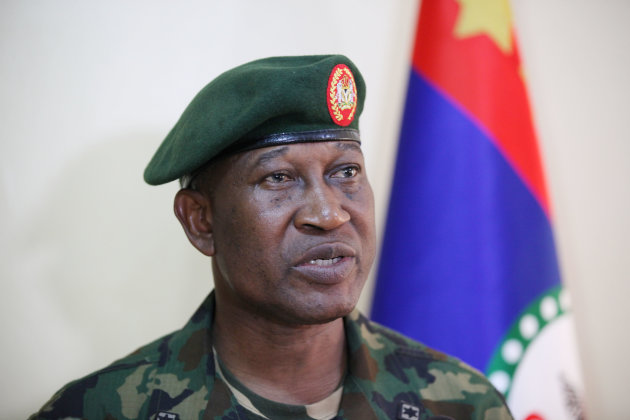
Brig. Gen. Chris Olukolade said Nigeria's military has regained ground across the northeast since President Goodluck Jonathan announced emergency rule for three states there, allowing soldiers to arrest anyone at will and occupy any building. However, there has not been any independent confirmation of any of the military's claims, as security forces shut down the region's mobile phone network and travel to the rural regions under assault remains impossible.
As the fighting continues, insurgents and civilians continue to flee. But the brigadier general remains convinced that this deployment will work as others failed to stop a bloody insurgency that has killed more than 1,600 people since it began in 2010.
"Recently, you will (have heard) one of their leaders making a call to their colleagues or whatever you call them from different countries to come to their help. And surprisingly, he also claims they are winning," Olukolade said in an interview with The Associated Press about the militants. "If they were winning, why are they looking for help?"
The military push in northeastern Adamawa, Borno and Yobe states largely has been fought outside of the public eye since Jonathan's order declaring a state of emergency in the region May 14. While jet fighters and heavy tanks have been seen traveling through major cities, the military says much of the fighting has focused on a forest reserve and the far reaches of Nigeria's borderlands with Cameroon, Chad and Niger.
In declaring the emergency, Jonathan offered a frank appraisal of the fight facing Africa's most populous nation, acknowledging that extremists had taken over villages and small towns in the region and raised their own flags, supplanting the control of Nigeria's weak central government.
Olukolade declined to offer specifics about how many of Nigeria's some 76,000 soldiers, sailors and airmen were involved in the operation. He previously told the BBC that the military carried out airstrikes against some suspected extremist camps, something he later declined to discuss. He said Thursday that the military had suffered "minimal casualties," while declining to offer any specific figures.
"We have not recorded civilian casualties to the best of our knowledge," Olukolade said. That comes after human rights groups and locals said the military purposefully killed at least 187 civilians during a recent raid on a fishing village in the northeast. The military has denied the claim, despite a Human Rights Watch report with satellite footage showing serious damage had been done to the town.
The threat has also become more severe. Authorities have said that in recent weeks extremist fighters, including those belonging to the loose extremist network known as Boko Haram, have been using increasingly sophisticated weapons, including truck-mounted anti-aircraft guns. Olukolade showed AP journalists a photograph Thursday of a shell he said soldiers collected from a battlefield in the northeast. The shell appeared to be about the diameter of a soda can and bore no manufacturer stamps.
"They've graduated from the usual trend of insurgents to go around with small arms," he said. "This time, they go out with very sophisticated and high-caliber weapons. ... So many of them are not indigenous to this area."
Olukolade added: "The issue of outside help cannot be completely ruled out. It is evident." He did not say who was arming the extremists, though diplomats and analysts say Boko Haram has loose ties to two other al-Qaida-aligned groups in Africa. Suspected Boko Haram fighters also were seen in northern Mali after Islamic extremists took control of towns there. Meanwhile, weapons used during the Libyan civil war likely also have entered greater West Africa.
As the fighting continues, it remains difficult for journalists to reach the regions affected. Military checkpoints exist on major highways and roads, limiting access. Human rights activists also have had difficulty reaching out to those living in the region.
Olukolade said anyone was welcome to see what the military had done, though he offered a large caveat for those wanting to travel in a region beset by insurgency and guerrilla attacks.
"As much as there is freedom of movement in Nigeria, as much as we have nothing to hide, we however only take responsibility for those people who offer to be guided by our security agencies," he said.
No comments:
Post a Comment